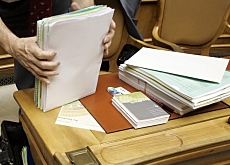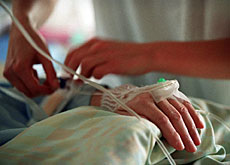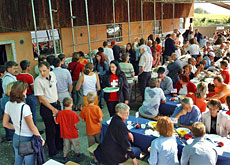Heavy session awaits parliament

Agricultural policy, climate and energy as well as reforms to the hospital scheme are issues expected to dominate parliament's spring session that has begun on Monday.
As Swiss citizens prepare for general elections this autumn, the two houses are facing a race against time. Nearly 1,000 items are still on the agenda before the end of this legislative period.
Additional meetings – four afternoons and two evenings – have already been scheduled over the next three weeks in a bid to get through as much legislative work as possible.
To mark Women’s Day next Wednesday the House of Representatives has set aside a morning to discuss equal opportunities. It will debate environment policy and climate change as well during a special afternoon meeting during the third week.
Health costs will be on the agenda in parliament when it discusses reforms of the hospital funding system, which is financed jointly by health insurance companies and the country’s 26 cantonal authorities.
Another key issue is whether patients should be free to choose the hospital where they receive treatment.
It is the latest attempt to reduce spending on health care. Next weekend Swiss voters have the final word on a plan to introduce a single health insurance company and premiums based on personal income and wealth.
Saving farming subsidies
The House of Representatives will also join in the debate on plans to liberalise the agriculture sector, including cuts in production subsidies.
The House is likely to further slow down the government’s proposed reforms. In December the Senate – the other parliamentary chamber – agreed a SFr13.7 billion ($11.3 billion) budget for agriculture over the next four years.
The credit package is SFr150 million above the proposal put forward by the cabinet.
Other controversial issues debated in the House of Representatives include plans for a national firearms database as well as an agreement with the United States on police cooperation in a bid to combat international terrorism.
The deal comes in the wake of a working agreement with the US authorities in force since 2002. But Washington has come in for increasing criticism over the activities of its secret services in Europe.

More
House of Representatives
Controversial army reforms
The Senate is going to consider army reforms that have already been rejected by the House after an unholy alliance of the left and the rightwing People’s Party. The senators could approve the project after the defence minister, Samuel Schmid, put forward a compromise.
Although the reform still calls for fewer armoured units and more infantry, only two instead of four of the army’s eight tank battalions would be disbanded.
The Senate will discuss a number of major credits, including SFr1.5 billion for humanitarian aid, SFr650 million for eastern Europe and central Asia, as well as the SFr1 billion for the European Union’s cohesion fund, accepted by voters last year.
Senators will also discuss company taxation, the CO2 tax, the liberalisation of the electricity market and promotional efforts for biofuels.
swissinfo, based on an Italian article by Andrea Tognina

More
Senate
The spring session takes place from March 5-23. The Swiss parliament normally meets four times a year for three-week sessions.
On March 8 the House of Representatives will discuss equal rights for men and women.
It also set aside time for a debate on March 21 about the country’s energy policy and the climate.
During the spring session, parliament will deal with two law projects many consider could threaten international legislation and direct democracy.
The first text concerns lifelong incarceration for dangerous criminals and sex offenders considered untreatable, approved by voters in 2004. According to the House of Representatives’ judicial committee, any application of this constitutional article would violate international law.
The second text concerns the introduction of a simplified initiative procedure, allowing promoters of an initiative to word a text in very general terms rather than propose a specific constitutional article.
The Senate judicial committee has recommended to not debate the text, saying that a simplified procedure would only lead to a spate of appeals and misinterpretations of voters’ intentions.

In compliance with the JTI standards
More: SWI swissinfo.ch certified by the Journalism Trust Initiative



You can find an overview of ongoing debates with our journalists here . Please join us!
If you want to start a conversation about a topic raised in this article or want to report factual errors, email us at english@swissinfo.ch.